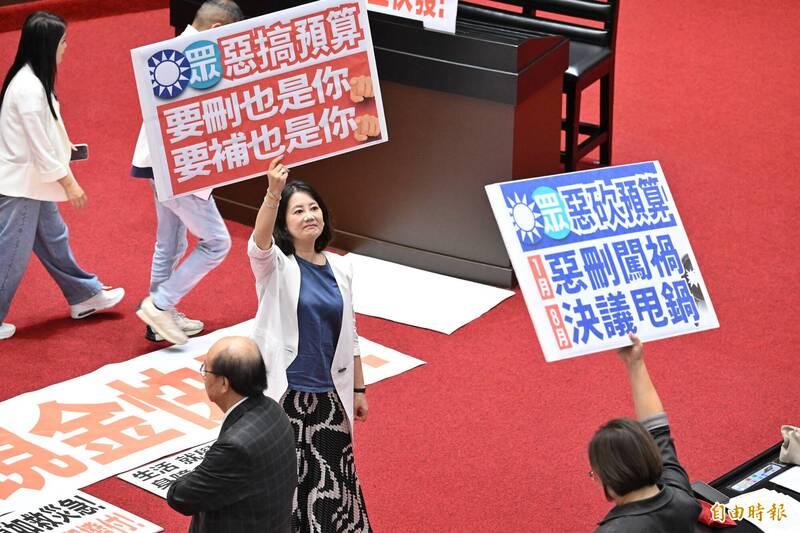The Legislative Yuan today passed a motion urging the Executive Yuan to undo its 25-percent cut to local government subsidies.
The legislature passed the motion with 57 in favor, 48 against and one abstention, as the opposition Chinese Nationalist Party (KMT) and Taiwan People’s Party (TPP) overcame the objections of the Democratic Progressive Party (DPP).
As the majority voted in favor of the motion, the Executive Yuan’s Directorate-General of Budget, Accounting and Statistics should reallocate budgets for the central government’s agencies in accordance with the previously passed budget cuts and fully disburse the local government grants, Legislative Speaker Han Kuo-yu (韓國瑜) said.

Photo: Chen Yi-kuan, Taipei Times
In May, the Executive Yuan announced plans to cut local government subsidies by 25 percent after the Legislative Yuan passed a central government budget that required it to reduce spending, leading to mayors and county commissioners urging it to reconsider the decision.
At the time, the Executive Yuan said that the reduction of local subsidies is equally in line with the Legislative Yuan’s general budget cuts and that it requested a constitutional judgement on the matter.
The cuts led to fierce criticism from the opposition parties, leading to the TPP legislative caucus proposing a motion to urge the government to immediately disburse the funds following the Executive Yuan’s announcement.
The subsidy cuts went against the intent of the original budget cuts and undermined local economic development, the TPP’s motion said, which was reviewed by the Finance Committee and inter-party negotiations.
The motion is to request the central government to return the NT$63.6 billion (US$2.12 billion) subsidies to local governments as they need the money to take care of the disadvantaged groups, KMT caucus secretary-general Wang Hung-wei (王鴻薇) said.
Additional reporting by Lin Hsin-han, Lee Wen-hsin and Fion Khan

The Coast Guard Administration (CGA) yesterday said it had deployed patrol vessels to expel a China Coast Guard ship and a Chinese fishing boat near Pratas Island (Dongsha Island, 東沙群島) in the South China Sea. The China Coast Guard vessel was 28 nautical miles (52km) northeast of Pratas at 6:15am on Thursday, approaching the island’s restricted waters, which extend 24 nautical miles from its shoreline, the CGA’s Dongsha-Nansha Branch said in a statement. The Tainan, a 2,000-tonne cutter, was deployed by the CGA to shadow the Chinese ship, which left the area at 2:39pm on Friday, the statement said. At 6:31pm on Friday,

The Chinese People’s Liberation Army Navy’s (PLAN) third aircraft carrier, the Fujian, would pose a steep challenge to Taiwan’s ability to defend itself against a full-scale invasion, a defense expert said yesterday. Institute of National Defense and Security Research analyst Chieh Chung (揭仲) made the comment hours after the PLAN confirmed the carrier recently passed through the Taiwan Strait to conduct “scientific research tests and training missions” in the South China Sea. China has two carriers in operation — the Liaoning and the Shandong — with the Fujian undergoing sea trials. Although the PLAN needs time to train the Fujian’s air wing and

Taiwanese celebrities Hank Chen (陳漢典) and Lulu Huang (黃路梓茵) announced yesterday that they are planning to marry. Huang announced and posted photos of their engagement to her social media pages yesterday morning, joking that the pair were not just doing marketing for a new show, but “really getting married.” “We’ve decided to spend all of our future happy and hilarious moments together,” she wrote. The announcement, which was later confirmed by the talent agency they share, appeared to come as a surprise even to those around them, with veteran TV host Jacky Wu (吳宗憲) saying he was “totally taken aback” by the news. Huang,

The American Institute in Taiwan (AIT) put Taiwan in danger, Ma Ying-jeou Foundation director Hsiao Hsu-tsen (蕭旭岑) said yesterday, hours after the de facto US embassy said that Beijing had misinterpreted World War II-era documents to isolate Taiwan. The AIT’s comments harmed the Republic of China’s (ROC) national interests and contradicted a part of the “six assurances” stipulating that the US would not change its official position on Taiwan’s sovereignty, Hsiao said. The “six assurances,” which were given by then-US president Ronald Reagan to Taiwan in 1982, say that Washington would not set a date for ending arm sales to Taiwan, consult